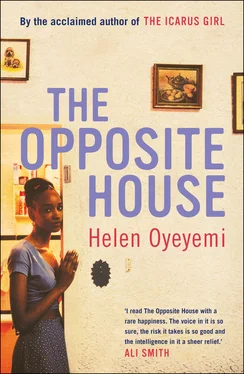Helen Oyeyemi - The Opposite House
Здесь есть возможность читать онлайн «Helen Oyeyemi - The Opposite House» весь текст электронной книги совершенно бесплатно (целиком полную версию без сокращений). В некоторых случаях можно слушать аудио, скачать через торрент в формате fb2 и присутствует краткое содержание. Год выпуска: 2008, Издательство: Bloomsbury UK, Жанр: Современная проза, на английском языке. Описание произведения, (предисловие) а так же отзывы посетителей доступны на портале библиотеки ЛибКат.
- Название:The Opposite House
- Автор:
- Издательство:Bloomsbury UK
- Жанр:
- Год:2008
- ISBN:нет данных
- Рейтинг книги:4 / 5. Голосов: 1
-
Избранное:Добавить в избранное
- Отзывы:
-
Ваша оценка:
- 80
- 1
- 2
- 3
- 4
- 5
The Opposite House: краткое содержание, описание и аннотация
Предлагаем к чтению аннотацию, описание, краткое содержание или предисловие (зависит от того, что написал сам автор книги «The Opposite House»). Если вы не нашли необходимую информацию о книге — напишите в комментариях, мы постараемся отыскать её.
The Opposite House — читать онлайн бесплатно полную книгу (весь текст) целиком
Ниже представлен текст книги, разбитый по страницам. Система сохранения места последней прочитанной страницы, позволяет с удобством читать онлайн бесплатно книгу «The Opposite House», без необходимости каждый раз заново искать на чём Вы остановились. Поставьте закладку, и сможете в любой момент перейти на страницу, на которой закончили чтение.
Интервал:
Закладка:
Near the end of our reading, I recognised Chabella’s handwriting. She had written: Please pray for Juan Carrera to be happy. Please pray for Juan Carrera to find whatever he came to this country looking for .
I didn’t read it aloud, but it was the first prayer I put back into the box; I had to do that so Amy Eleni wouldn’t see it. It was the only bitter prayer in there, the only prayer that betrayed its writer.
‘I’m going to go and find Sara,’ Amy Eleni told me, wriggling off the bed with the re-sealed box under her arm. I lay flat and began tracking shadows on the ceiling, pulled my polo neck up so that it covered the bottom of my chin, began my great, private worry about my life.
Amy Eleni paused at the door, turned, studied me, came back to me. She stood over me, sweetly serious, and I hauled myself up by degrees, matching her look for look; the inches between our faces grew warmer as they fell away. She dipped her head to kiss my mouth, and whispered against my lips, ‘Happy graduation.’ Her eyes were closed, and mine were wide open.
When Aya visits now, Amy’s wrists are newly, tightly re-bandaged, her eyes are crayoned round with waning purple, and she is still so pale — even her lips have shed colour. She throws her arms around Aya and hugs her, so light a pressure that Aya thinks she might be imagining it. ‘Please stay a while,’ she says. ‘I loved it when you came to see me. You seem to care.’
‘I can’t help it,’ Yemaya says, simply. Amy laughs, but Aya is serious. Amy is only laughing because she is pretending that she can switch her caring on and off, admire different books, love different people, discard her own life.
Aya moves about the somewherehouse, finishing her self-appointed task of returning all the mirrors that Proserpine brought down. The attic, reluctant to have the mirrors back, gives vent to floorboard groaning. Mama has put the Kayodes’ rooms in order; their winding cloths are unpinned from the walls and heaped onto chairs. Their chessboard is gone. Their cupboards are pleasantly bare, the shelves are free of dust and expectation.
Aya had expected to find complicated packages of newspaper, braided trails of string, or some other closed thing that the Kayodes might have used to keep their speech amongst themselves. She had not expected to miss them as much as she does. She draws a hand over her eyes and picks up a mirror that rests in the arms of the rocking chair. She has asked Tayo to follow her here, and he comes — but hesitantly. The somewherehouse’s cedar beams breathe wheeeee to bring their smell in after him. She wonders if the house will not keep him. Tayo hesitates, then draws her close to him, sits in the rocking chair and takes her onto his lap, pushing her hair aside to whisper into her ear, ‘But what are those figurines downstairs supposed to be?’
He has to close his eyes for her so that, with a fingertip, she can spirit ash away from those spaces where he is softest.
‘What figurines?’
And after all people are sitting in the basement
a boy, a man, a woman,
withered, rheumy-staring from a carousel of spider webs.
Aya looks at Tayo and lets him see in her eyes what is happening. He says feebly, ‘Yeye, it’s all right. They’re not real.’ He is far more frightened than she is.
High-heeled footsteps clatter above; Proserpine has come in through the front door.
Aya decides quickly. She breaks an old chair, catches its leg up in her hand and goes to put an end to Mama Proserpine.
‘Yeye!’ Tayo grasps her wrist and tries to follow her, but she eludes him and the basement door is locked tight as she passes into the hallway — she makes it so.
Proserpine turns a pale stare of appeal to Aya. In her arms, caught up in her cloak, a rooster tramples air in a fright of feathers.
‘Yeye, listen —’
The rooster escapes Proserpine’s arms as Aya comes at her. Aya is like thunder. Blood wells from Proserpine’s lip; she is dazed, delayed.
Aya cries to her, ‘You told me you took them home. But you killed them.’
‘Yeye —’
Aya says, grimly, ‘Shut your mouth. Don’t ever address me that way. Proserpine, I saw you from the first.’
Aya has the chair leg to Proserpine’s throat. Proserpine has not cowered, though one of her eyes has swollen shut. The gaze of the other eye, the bulge of surprise in it — that drives Aya outside of herself. Aya’s hand is a hot-red clutching; the wood splinters it, and she doesn’t care. Her next blow snaps the chair leg clean in two.
‘Yeye,’ Proserpine wails. ‘Don’t you know how long it took you to find this place? When you got here, the Kayodes had only just arrived.’
‘Which Kayodes? The ones you killed?’
Proserpine spits a messy tooth into her cupped hand.
Aya asks, very quietly, ‘When?’
Proserpine smears down the wall until she is crouching, the heels of her shoes broken. Aya bends to hear her, her face knitting itself ready to spit. And Proserpine tells her about the Kayodes now, Proserpine tells and tells. With each repetition the story is truer.
By the time Aya asked her where the Kayodes were, the Kayodes were already dead. Because while Aya was gone through the London door, the Kayodes began starvation. But they didn’t know what the feeling was — they didn’t know that the ache meant ‘eat’.
Proserpine cooked for them, so many desperate meals: she cooked amala and ewedu, eko, moin-moin, bistecca, ajiaco , fish and chips.
The Kayodes tried to feed on the smell; they breathed in until their lungs let the scent escape. But then one of them always said to the other, ‘Proserpine must not waste this food. Proserpine must give this food to someone who needs to eat.’
Soon the Kayodes grew too weak even to talk to each other.
In the basement they sat and stared and waited for Aya’s Papa.
They were certain that Aya’s Papa would not forget them.
Then they were less certain.
Then they grew bitter.
And then they died, one immediately after the other, click, click, click, like three switches breaking a circuit. How afraid the third one was when he saw the dying moment begin in the first.
16 ventured all (upon a throw)
Aya and Proserpine strain and sweat and dig a shallow grave around the back of the somewherehouse, in a spot where the grass and trees dip at the same point. Proserpine weeps. Her hands claw at Aya as if she is a closing door with home on the other side. Aya is suffocated by icy leaves. She leaves that place, leaves that woman.
Aya watches Amy untie the knots that secure her handkerchiefs to her belt and spread the silken squares out, full-length, over her bed. Picking one up at the corner feels like pinching a beautiful nothing between the fingertips.
‘Do you want them?’ Amy asks.
Aya lets the handkerchief settle back onto the covers.
Amy turns her bruise-hooped back to Aya and brushes the handkerchiefs onto the floor before she climbs into bed.
‘Look what Tayo gave me,’ Amy says, after a moment. She opens her hand and a saint is in it; a medallion with dainty piecrust metalwork running round it. The saint is a woman with a long nose, hair demurely covered by a shawl, hands crossed on her breast.
‘It’s Our Lady of Mercy,’ Amy says. She closes her hand with a grim smile and draws her saint back under the covers. She gets lost in a dark memory that she doesn’t say aloud.
The handkerchiefs are waiting on the floor. On her way out, Aya wonders, for less than a moment, what it would be like to own these handkerchiefs, to leave an aftermath of honey perfume. In Tayo’s room, the white pointed tips of wet flowers spill over the tops of every drawer in his cupboard, as if the cupboard is crammed with people who are reaching their hands up and willing their fingers to escape the trap.
Читать дальшеИнтервал:
Закладка:
Похожие книги на «The Opposite House»
Представляем Вашему вниманию похожие книги на «The Opposite House» списком для выбора. Мы отобрали схожую по названию и смыслу литературу в надежде предоставить читателям больше вариантов отыскать новые, интересные, ещё непрочитанные произведения.
Обсуждение, отзывы о книге «The Opposite House» и просто собственные мнения читателей. Оставьте ваши комментарии, напишите, что Вы думаете о произведении, его смысле или главных героях. Укажите что конкретно понравилось, а что нет, и почему Вы так считаете.












